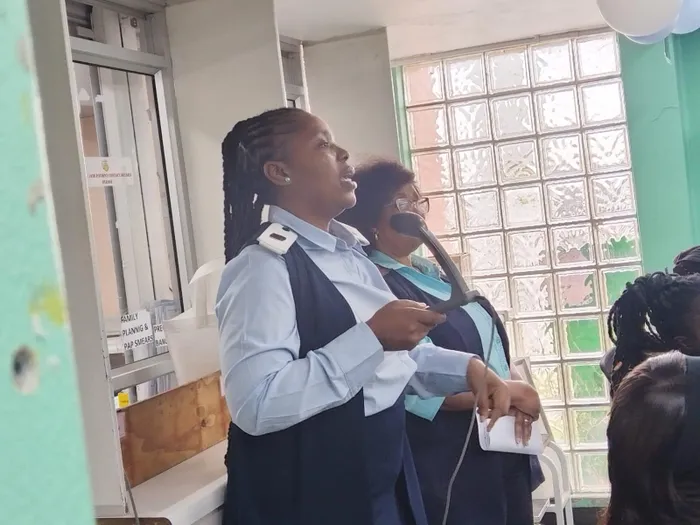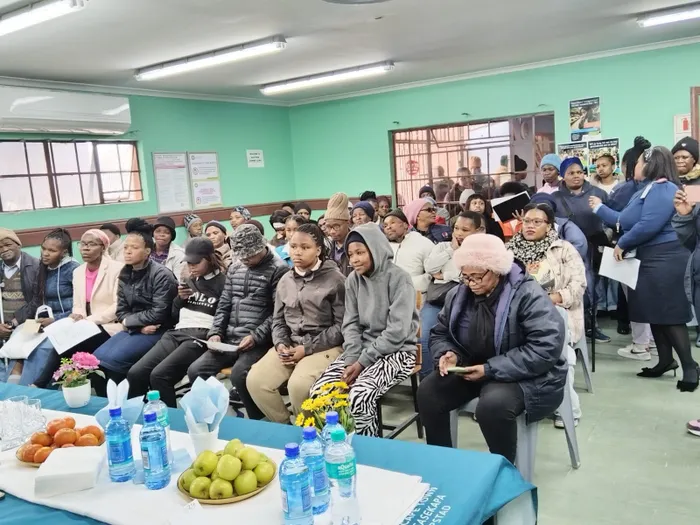
Matthew Goniwe Clinic nursing staff.
Image: Phiri Cawe

Founder of Diabetes Wellness Club, Sister Nondyebo Sampempe, at the Matthew Goniwe Clinic. Sister Sompempe is looking forward to running the club that will be of help to people of Makhaza.
Image: Phiri Cawe

Khayelitsha residents in Makhaza at the diabetes wellness day.
Image: Phiri Cawe
A sharp rise in diabetes cases in Makhaza, Khayelitsha, has prompted health workers to establish a support club aimed at preventing and better managing the disease.
The Matthew Goniwe Clinic launched its new Diabetes Wellness Club on Wednesday, September 17, in response to what staff describe as "a growing health challenge in the community."
Nurses and doctors at the clinic say they are treating an increasing number of patients with diabetes, putting further strain on already stretched local health services.
The club was founded by Sister Nondyebo Sampempe, who said the surge in diabetes cases is linked to changes in diet and lifestyle, with many people opting for sugary drinks and processed foods instead of healthy meals and regular exercise. She warned that unmanaged diabetes can lead to serious, even fatal, complications.
“Our challenge in Makhaza is how people eat. We have found that many individuals are now diabetic because they are not living a healthy lifestyle. We want them to join the club and practise what we will be teaching them," she said, adding that eating healthy does not mean spending money on expensive foods.
"It simply means eating vegetables, drinking water, and exercising. I do not think cabbage is that expensive, nor are other greens. We are not saying people must buy olive oil; we are saying they should use water,” she said.
Sister Sampempe also highlighted that, over time, diabetes can lead to serious conditions such as heart disease and blindness, and that wounds may struggle to heal. The club, she said, seeks honest individuals who are willing to make a positive change.
Doctor Aleker Kimane, who spoke on mental health, said that 88% of people with mental health issues are affected by diabetes and weight gain.
She explained that diabetes can lead to other conditions, including anxiety, depression, and eating disorders. She encouraged families with members who have diabetes to provide support, as the lack of support is another significant challenge.
She invited anyone wishing to discuss their condition to visit the clinic and speak with the staff instead of remaining silent.
A diabetic man, who wished to remain anonymous, stated that he was excited about having a space where people could discuss their challenges.
“It is good to have such an initiative that we never had before. This will really work to our advantage. As diabetics, we will be able to share our challenges and stories. My wish is for every facility to have such a club,” he said.
Social worker Nomvuzo January said that diabetes is not only growing in Makhaza but also in all areas of Khayelitsha. She said that in the health facilities she visits, there is a significant challenge with the epidemic.
“Khayelitsha is the area in the metro where diabetes is growing the fastest. I go to Town 2, Kuyasa, Luvuyo clinics, and others,” she said.
Ms January emphasised that people’s coping capacities are often overwhelmed with issues that affect their health status. She stated that there should be a way to manage these challenges, which is why the facility has formed the diabetes prevention project